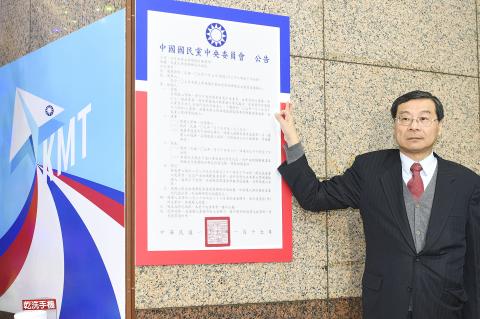The Chinese Nationalist Party (KMT) would decide whether to improve or abandon the so-called “1992 consensus” after considering the opinions of party members and the public, Acting KMT Secretary-General William Tseng (曾銘宗) said yesterday.
While many young party members have called for a revision of the KMT’s cross-strait policy, which is based on the so-called “1992 consensus,” whether the party should improve upon the concept or abandon it altogether is not up to the KMT chairperson and a handful of members, Tseng said at KMT headquarters in Taipei.
Before making a decision on the issue, the party must consider the opinions of all its members and those of the 23 million Taiwanese, he said.

Photo: George Tsorng, Taipei Times
“The KMT hopes to reflect the voice of the public,” Tseng said.
Tseng and KMT Central Standing Committee member Lin Rong-te (林榮德) on Wednesday were selected to be the party’s acting secretary-general and acting chairman respectively after former KMT chairman Wu Den-yih (吳敦義) stepped down earlier that day to shoulder responsibility for the party’s defeats in last Saturday’s presidential and legislative elections.
A new party chairperson and Central Standing Committee are to be elected on March 7.
During the transition period, the KMT would be simultaneously preparing for the elections and promoting reforms, Tseng said.
After some party members proposed holding forums to form a consensus about the party’s new direction or establishing special committees to lead reform efforts, Tseng said that the KMT is reviewing those suggestions.
“The KMT has no time to waste and will very soon propose strategies and methods for reforming the party,” he said. “We will not let our party members, Republic of China citizens and everyone else down.”
The KMT Central Standing Committee on Wednesday is expected to approve a new list of members, he said, adding that some members who had resigned would be urged to remain in their positions.
The members who stepped down with Wu included KMT vice chairmen Tseng Yung-chuan (曾永權) and Hau Lung-bin (郝龍斌), vice secretary-general Tu Chien-teh (杜建德), Administration and Management Committee director Chiu Da-chan (邱大展), Culture and Communications Committee director-general Cheng Mei-hua (程美華) and deputy secretary-general Alex Tsai (蔡正元).
KMT New Taipei City chapter head Lee Chien-lung (李乾龍) and Taipei chapter director Huang Lu Ching-ju (黃呂錦茹) also resigned following last Saturday’s elections.
The KMT is to accept registrations to run for chairperson on Feb. 3 and Feb. 4.
Under the party’s regulations, to qualify as a candidate a party member must collect signatures from at least 3 percent of KMT members before Feb. 4.
Those who have openly announced they plan to run include National Taiwan University political science professor Chang Ya-chung (張亞中) and Blue Sky Action Alliance convener Wu Chih-chang (武之璋).
The so-called “1992 consensus” — a term former Mainland Affairs Council chairman Su Chi (蘇起) in 2006 admitted making up in 2000 — refers to a tacit understanding between the KMT and the Chinese Communist Party that both sides of the Taiwan Strait acknowledge there is “one China,” with each side having its own interpretation of what “China” means.

US climber Alex Honnold is to attempt to scale Taipei 101 without a rope and harness in a live Netflix special on Jan. 24, the streaming platform announced on Wednesday. Accounting for the time difference, the two-hour broadcast of Honnold’s climb, called Skyscraper Live, is to air on Jan. 23 in the US, Netflix said in a statement. Honnold, 40, was the first person ever to free solo climb the 900m El Capitan rock formation in Yosemite National Park — a feat that was recorded and later made into the 2018 documentary film Free Solo. Netflix previewed Skyscraper Live in October, after videos

NUMBERS IMBALANCE: More than 4 million Taiwanese have visited China this year, while only about half a million Chinese have visited here Beijing has yet to respond to Taiwan’s requests for negotiation over matters related to the recovery of cross-strait tourism, the Tourism Administration said yesterday. Taiwan’s tourism authority issued the statement after Chinese-language daily the China Times reported yesterday that the government’s policy of banning group tours to China does not stop Taiwanese from visiting the country. As of October, more than 4.2 million had traveled to China this year, exceeding last year. Beijing estimated the number of Taiwanese tourists in China could reach 4.5 million this year. By contrast, only 500,000 Chinese tourists are expected in Taiwan, the report said. The report

Temperatures are forecast to drop steadily as a continental cold air mass moves across Taiwan, with some areas also likely to see heavy rainfall, the Central Weather Administration (CWA) said. From today through early tomorrow, a cold air mass would keep temperatures low across central and northern Taiwan, and the eastern half of Taiwan proper, with isolated brief showers forecast along Keelung’s north coast, Taipei and New Taipei City’s mountainous areas and eastern Taiwan, it said. Lows of 11°C to 15°C are forecast in central and northern Taiwan, Yilan County, and the outlying Kinmen and Lienchiang (Matsu) counties, and 14°C to 17°C

STEERING FAILURE: The first boat of its class is experiencing teething issues as it readies for acceptance by the navy, according to a recent story about rudder failure The Hai Kun (海鯤), the nation’s first locally built submarine, allegedly suffered a total failure of stern hydraulic systems during the second round of sea acceptance trials on June 26, and sailors were forced to manually operate the X-rudder to turn the submarine and return to port, news Web site Mirror Daily reported yesterday. The report said that tugboats following the Hai Kun assisted the submarine in avoiding collisions with other ships due to the X-rudder malfunctioning. At the time of the report, the submarine had completed its trials and was scheduled to begin diving and surfacing tests in shallow areas. The X-rudder,